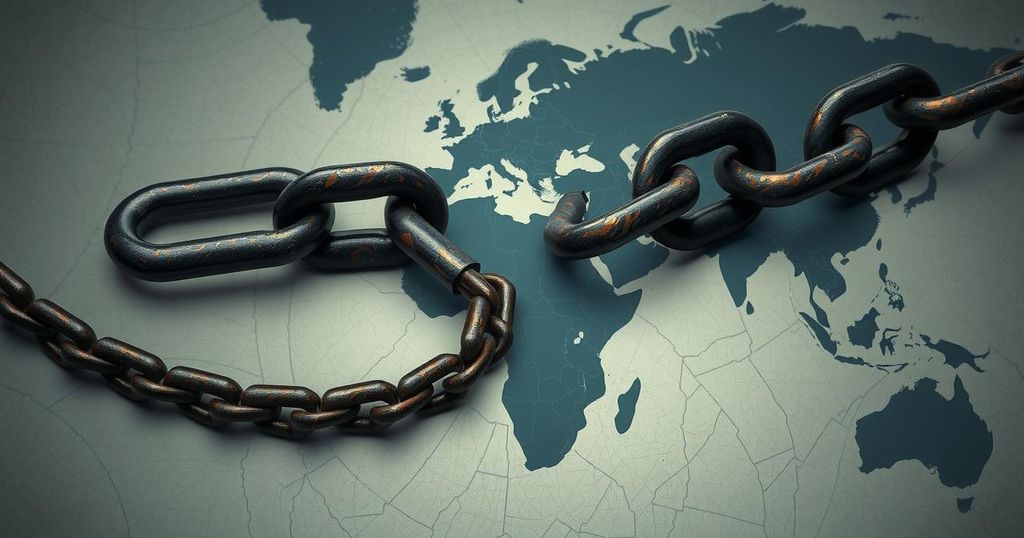The DR Congo has cut diplomatic ties with Rwanda amid escalating conflict with the M23 rebel group advancing on Goma. Fighting has resulted in significant casualties, including peacekeepers, and led to the displacement of thousands. Accusations of Rwandan support for M23 complicate the geopolitical landscape, prompting emergency discussions at the U.N. and raising humanitarian concerns.
The Democratic Republic of the Congo has officially severed diplomatic ties with Rwanda as hostilities escalate involving the M23 rebel group, which is advancing towards Goma. The conflict, attributed to support from Rwanda for the rebel faction, has resulted in significant casualties, with at least 13 peacekeepers and foreign troops reported dead, alongside the displacement of thousands of civilians. The M23 group has made notable territorial gains, causing heightened concern for the safety of Goma’s approximately two million inhabitants.
Congo, backed by the United States and U.N. experts, accuses Rwanda of supporting M23, a faction formed by defectors from the Congolese army over ten years ago. Despite Rwanda denying any such involvement, it has previously admitted to deploying troops in eastern Congo for security purposes amidst suspicions of rising Congolese military presence near the border. Recent estimates suggest up to 4,000 Rwandan soldiers might be engaged within Congolese territory.
Following a formal statement from the Congolese Foreign Ministry on Saturday, diplomatic relations with Rwanda have been immediately cut, and all diplomatic personnel have been withdrawn. The situation has prompted the U.N. Security Council to convene an emergency meeting to address the escalating violence in eastern Congo. Heavy gunfire has been reported in Goma, signaling the intensification of conflict at the frontline.
Civilians are fleeing Goma, driven by fears of violence spilling into the city as fighting between M23 and government forces continues. Residents from nearby camps, such as Kanyaruchinya, are seeking safety despite doubts about their security in Goma. There have also been attempts to cross into Rwanda for refuge, highlighting the desperate situation faced by those affected by the conflict.
The M23 has recently captured Sake, located about 27 kilometers from Goma, raising alarms about the city’s impending vulnerability. On the ground, Congolese military forces, assisted by U.N. peacekeepers and allied troops, have actively repelled M23 offensives. Tragically, multiple peacekeepers from South Africa, Uruguay, and Malawi have lost their lives in these ongoing clashes, underscoring the dire humanitarian impact of the conflict.
The U.N. peacekeeping mission, known as MONUSCO, has been present in Congo for over twenty years and maintains approximately 14,000 personnel to stabilize the region. While appropriate responses have been sought to stabilize the situation, the humanitarian crisis continues to escalate, deeply affecting the lives of those in eastern Congo.
The ongoing tension between the Democratic Republic of the Congo and Rwanda stems from historical conflicts and the presence of numerous armed groups vying for control of mineral-rich areas. The M23 rebel group, primarily composed of ethnic Tutsis, has a controversial history linked with foreign influence and internal strife. The situation has evolved into a humanitarian crisis with thousands displaced and lives lost amidst military confrontations and international scrutiny. Rwanda’s government maintains a strategic narrative, asserting that its military presence in eastern Congo is necessary for national security. Observers note that the complexity of these relations includes historical grievances, ethnic tensions, and the profound implications of foreign support for armed factions. The U.N. has been engaged in peacekeeping efforts for many years, but the persistence of violence raises questions about the efficacy of these interventions and the protection of civilians. The involvement of multiple nations and international organizations indicates the global implications of the conflict, as well as the urgent need for diplomatic solutions to restore peace and secure humanitarian support for affected populations. Negotiated settlements and joint efforts are essential for addressing both the symptoms and root causes of the crisis in this region.
The severing of diplomatic ties between the Democratic Republic of the Congo and Rwanda underscores the escalating conflict surrounding the M23 rebel group, which continues to threaten the stability of Goma. The recent intensifications of hostilities have resulted in significant civilian displacement and tragic losses among peacekeeping forces. The international community must respond to this worsening humanitarian crisis with a focus on conflict resolution and systemic support for those affected. The urgency of addressing the underlying issues of the conflict remains paramount to ensure long-term peace and security in the region.
Original Source: www.france24.com






